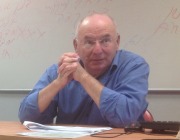I am an intellectual historian of early modern and modern Europe and America, with special interest and emphasis on the role of history of ideas in shaping people’s modes of conduct and conviction in past times, including religious thought and belief. My previous studies dealt with the conquest of America by European powers during the 16-18th centuries; apocalypse and eschatology in the Protestant Reformation and the Puritan Revolution of the 16th-17th centuries; Puritan migration to America in the 17th century; and the Scientific Revolution of the 16-18th centuries. In recent years I began to explore some important dimensions in the traumatic experience of intellectual exiles, mostly Jews from Nazi Germany - people like Hans Baron, Erich Auerbach, Thomas Mann, Ernst Cassirer, Max Horkheimer, Theodor Adorno, and more. These German-speaking intellectuals were among the many who fled continental Europe with the rise of Nazism in the 1930s. For each, the political calamity of European fascism was simultaneously a profound intellectual crisis, which required an intellectual response. Their exilic experience was crucially shaped by the horrors of Nazism and World War II; hence, they all dedicated their works written in exile to save Western humanist tradition in face of Nazism and Fascism. My goal in these studies is to do more than disclose how highly-specialized scholarship was enlisted so deftly in this struggle against unprecedented brutishness, which scarred all who were touched by it even as they managed to escape to welcoming universities far removed from immediate danger. I insist that forced exile magnifies the polemical and political nature that surely runs through all "normal" scholarship, reminding us that all scholarship is performed however much scholars may prefer to see themselves as doing otherwise. Forced exile pushes to the surface what typically goes unnoticed and therefore ordinarily requires enormous contextual spade-work to expose. Furthermore, forced exile amplifies deeper political timbres and preconceptions constitutive of all great scholarship, including that which is written in quieter and more comfortable times. My many studies in this field of German intellectual exiles and exilic displacement are a cross-section of modern scholarship composed under exceptional duress and anxiety. My works exploit this exceptional duress and anxiety in order to magnify prejudices that otherwise escape notice.
Research Interests:
· Early modern European history
· Early American history
· Modern European history
· Intellectual history
· History of Ideas
· Philosophy and history
· Religious history

